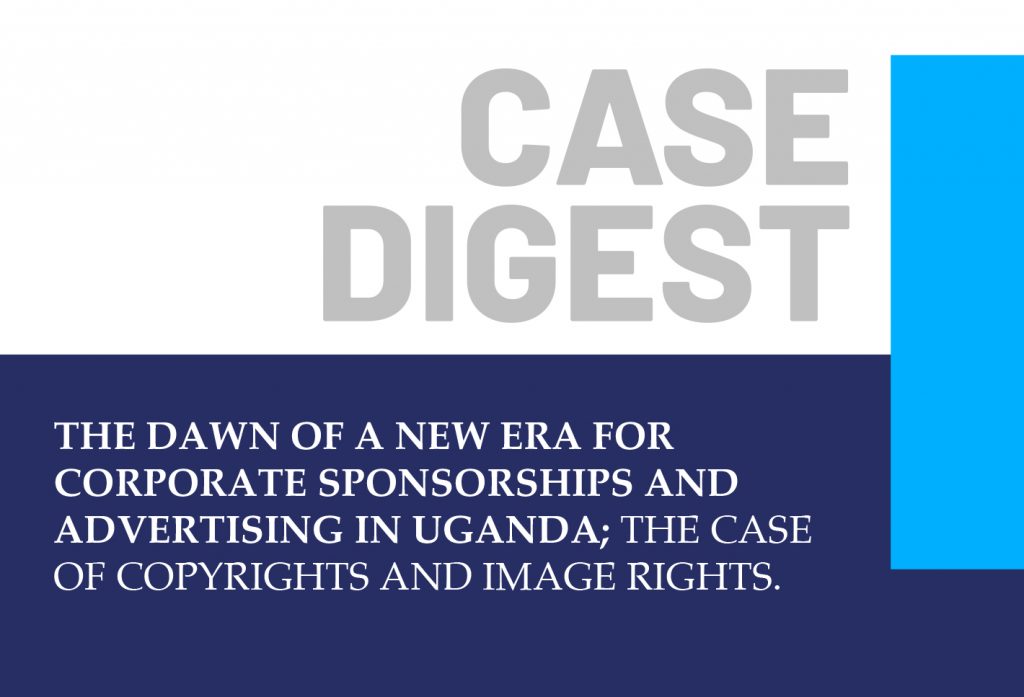CASE DIGEST: Proline Soccer Academy Limited Versus MTN Uganda Limited, M/s QG Saatchi & Saatchi & FUFA (Uganda) Limited; H.C.C.S No. 317 of 2011
Summary of Court findings
The Hon. Justice Stephen Mubiru has held that in the event of a clash between the right to own one’s own image and the copyright over the image, such as a photograph in this instance, the photographer’s freedom to exploit the economic rights is limited by the image rights of the person who happens to be the subject of the photo. The Court further held that image rights create an external limitation of copyright law where the subject of the copyright is an image of an individual.
In this regard, the court concluded that the image rights of a football player originally belongs to the individual and without unequivocal written consent to the use of the player’s images, FUFA has no rights to the commercial use of the player’s images
Factual background
Pro-Line Soccer Academy Limited (the “Plaintiff”) instituted H.C.C.S. No. 317 of 2011 against MTN Uganda Limited and M/s QG Saatchi & Saatchi (the “defendants”) for declaratory orders that the Defendants were in breach of an advertisement and promotional contract signed with the Plaintiff and M/s QG Saatchi & Saatchi (the “advertising agency”), purportedly for the benefit of MTN Uganda Limited. The plaintiff agreed to prepare eleven (11) Uganda Cranes National Football Players for exclusive usage in advertising and promotional activities of MTN Uganda Limited for an explicitly agreed period of one (1) year. The images were used over the duration of the contract in advertising across multiple media platforms, including print media, electronic media, and online which usage continued after the expiry of the contract.
The plaintiff contended that the continued use of the images after the expiry of the advertising contract constituted an infringement of the image rights vested in it by the eleven “Uganda Cranes” team members.
In its defense, MTN Uganda (the “1st Defendant”) argued that it was granted rights to feature images of team members, individually or as a team, of the “Uganda Cranes” in its advertising and promotional activities through a sponsorship arrangement with the Federation of Uganda Football Associations (FUFA). MTN Uganda further argued that the Plaintiff unequivocally agreed to transfer the copyright, performing rights, and all other rights in the advertising material in the photographs. MTN Uganda Limited contended that by that agreement, it obtained property in the images, and their continued use had not violated any rights of the plaintiff. In addition, MTN successfully applied to have FUFA added as a third party to the suit on account of an indemnity clause contained in the Sponsorship Agreement between the parties.
On its part, FUFA argued that by its position as the national institution responsible for the development, management, and regulation of the game of soccer in Uganda, it was entrusted to promote and organize international matches for the National soccer team, the Uganda Cranes, by virtue of which, it possessed the rights to the images of the soccer players as individuals and also collectively as the national team.
Detailed findings of the Court
- The High Court held that consent to the use of a sportsperson’s image rights in either an individual or collective context by the club or national association must be unequivocal. In this instance, the court held that there was no unequivocal transfer or assignment of the player’s image rights. As the players had no agreement with FUFA, the Court rejected the argument that it is implied in the fact of being called to the national team, that a player consents to the use of his image by FUFA for purposes of advertising the tournament and also in advertising the commercial interests of the sponsors of the tournament.
- Unless there is unequivocal consent, the image rights of the sportsperson belong to the individual, and where there is a conflict between the copyright vested in the author of a photograph and the image rights belonging to the subjects of the photos, then image rights prevail over copyrights.
- The Court agreed with MTN Uganda’s argument that the subject matter in this suit and the subject matter of the sponsorship agreements were the same. It, therefore, follows held that MTN is at liberty to pursue FUFA for indemnification from loss arising from the sponsorship agreements.
Legal implications and key takeaways.
- The case has strengthened the capacity and rights of any person regardless of their social status or standing to protect and seek redress arising from the unauthorized use of their image rights by third parties for commercial/ advertising/ publicity purposes, even in circumstances where they may have consented to the taking of their photographs, in the absence of an unequivocal consent for the exploitation of their image rights.
- Event organizers and public photographers are encouraged to obtain unequivocal (preferably written) consent from individuals before any person’s image rights contained in any photograph can be exploited for commercial purposes. It is no longer enough to issue a disclaimer that “by participating in the event, you consent to the use of your photos”. Where the consent of the individual is unclear, the image rights of the individual will prevail over the copyrights.
- In the event of a conflict between the right to own one’s own image and the copyright over the image, such as a photograph in this instance, the photographer’s freedom to exploit the economic rights is limited by the image rights of the person who happens to be the subject of the photo. This conflict could arise through the unauthorized capture of a person’s image during a public event, festival or sports event.
- As a result of this decision, there is a need to revisit the contracts involving the commercial use of photography, and there is even more need to obtain unequivocal consent from the person portrayed in the photograph, as use of their likeness or image without their unequivocal consent will prevail over the copyright in the image. The Court emphasized that there is an exception where the image used is for public information and not commercial benefit.
- This case highlights the importance of indemnity clauses under the law of Contract. As there is no possibility of estimating a loss that may arise out of a transaction, such as a sponsorship in the instant case, we strongly encourage that corporate sponsors of any event, team sport, festival, or function, should strongly include indemnity clauses in all their sponsorship or advertisement contracts entered into with counterparties as was the case in this matter. This will help cover any loss arising from any unforeseen liability arising from the potential use of third party images during the course of the sponsorship/ advertisement.




